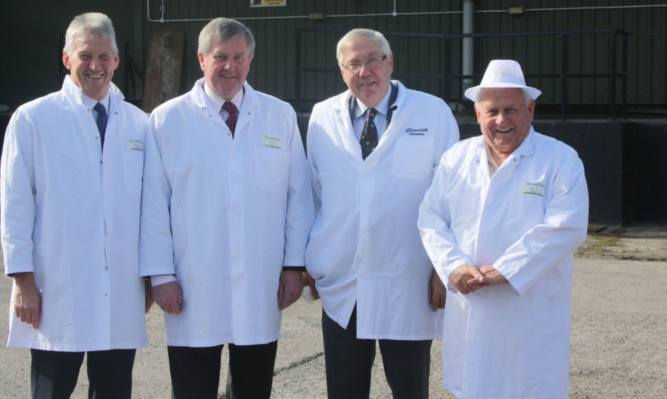Scotland’s largest farmer and chairman of the UK’s second largest egg producer has come out strongly in favour or Better Together.
John Campbell, who with his wife Cathie founded the Glenrath Eggs business in 1963 on their farm near Peebles, have grown it into a business employing 230 staff, including 18 members of their family from three generations.
The company supplies most of the major supermarkets in the UK and has an annual turnover of £56 million.
Since 2000, the family have invested £60m in production and packing, including a large shift to free-range production.
The latest venture, which should be up and running by November, is a £6m processing plant, which will produce pasteurised liquid egg from around 10% of the 1.4 million eggs produced on the farms every day.
Mr Campbell fears a Yes vote will place Glenrath at a competitive disadvantage.
He said: “ It is unbelievable how important the UK market is for us. The egg industry is in over-production at the moment, it would be very easy for competitors based in England to go to supermarkets and say: ‘Don’t go to Scotland for your eggs.’
“This could well happen if there was a Yes vote on September 18 but we are already seeing signs of it, having lost a large order without explanation. It is a very serious worry for us.”
Mr Campbell’s daughter Karen added her concerns about the availability in Scotland of the Red Lion quality assurance mark. This may only be small red stamp on each egg but it has huge importance.
It is part of the UK-administered British Egg Council quality assurance scheme and without it there is no market.
Shell eggs from the Republic of Ireland are effectively excluded from the UK market because they are not part of the scheme and Karen’s worry is that eggs from an independent Scotland might not qualify for the mark.
Mr Campbell also had concerns over packaging and labelling costs were Scottish retail demands to differ from the rest of the UK’s. Packaging costs already exceed the wage bill for the business and any changes are expensive to implement.
The family were hosting the final Rural Better Together press briefing before the referendum next Thursday.
“The main issue we want to highlight today is the importance of the UK market to Scottish producers,” said rural campaign chairman George Lyon.
“The market in the rest of the UK takes 70% of our farm production. It is crucial and it would be complete folly to put up any barriers to trade.”
Keith Redpath, an arable operator based near Kelso, highlighted his own worries.
Around 40% of the land he farms is over the border in Northumberland.
He said: “Only last weekend we moved 500 tonnes of grain north over the border for drying and storage.
“It is likely to be sold to a buyer based in England but could end up going to a Scottish end user. How is that all going to work if we are using a different currency?”
If need be, he was prepared to move his business office to England.
Carnoustie farmer and vice-chairman of Rural Better Together, Willie Porter, explained that, as well as being a soft fruit grower, he was a director of Angus Soft Fruits, an organisation with 28 grower members and an annual turnover of £63m.
Scottish-produced fruit was thebackbone of the business but imports from around the globe were used to ensure 52 weeks a year supply to supermarkets.
“It is quite straightforward,” he said. “Without the English market, we wouldn’t have a market.
“Every year, by the nature of soft fruit production, we have to work through a week or two of glut and rely on our customers to help us through it.
“If Scotland was separate my fear is that English buyers would favour producers in Kent or elsewhere at such times.”
Mr Redpath added: “It would be nice to think that we would not be alienated from our customers (in the event of a Yes vote) but that is not how human nature works.
“It would be very easy for them to say: ‘The Scots want rid of us so let’s just get rid of them’.”
